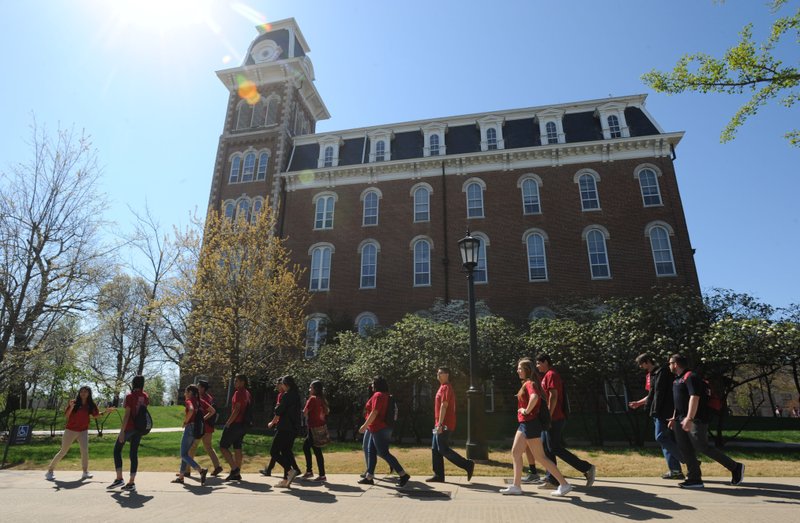Higher education officials in Arkansas on Tuesday expressed support for international students.
The University of Arkansas, Fayetteville enrolled 54 graduate students and two undergraduate students this past fall from Iran, which is on the list of countries with strong travel restrictions to the United States.
The U.S. Supreme Court on Tuesday upheld what's commonly referred to as the travel ban, with the most recent ban coming about via a proclamation in September by President Donald Trump. The ban has been revised amid legal scrutiny since an initial Trump executive order in January 2017.
UA-Fayetteville also enrolled six students from Libya and a student from Syria in fall 2017, with both of those countries on the travel ban list.
"This ruling doesn't change the fact that we will continue to recruit and support international students, faculty and staff because they are an important part of our campus community and their presence here, and the contributions they provide, better our University, state and nation in many ways," Chancellor Joe Steinmetz said in a statement.
Among Iranian students and potential students, "people are discouraged," said Mohsen Dadashi, 27, a UA-Fayetteville industrial engineering doctoral student and former president of the UA-Fayetteville Iranian Student Association.
He said his younger cousin would normally consider attending school in the United States, but has no plans to do so because the restrictions on travel mean that he would not be able to easily visit family or have family visit him.
Dadashi said he came to Fayetteville on what's known as a single-entry visa, meaning that he would need to successfully apply for re-entry to the United States if he were to leave the country.
Dadashi said he doesn't want to risk being denied re-entry and having his education derailed, so he has not been home to visit family since arriving in Fayetteville in 2013.
He said his family had plans to visit him in the United States, but said he expects that to be nearly impossible with the travel ban in place.
The state's largest public university enrolled a total of 1,461 international students this past fall, according to UA data.
Higher education leaders nationally have expressed concern about the travel ban.
"Public universities remain deeply concerned about this misguided travel ban and the message it sends to all international students and scholars who have long been drawn to U.S. universities to undertake studies, conduct research, and teach students at our world-leading institutions," Association of Public and Land-grant Universities President Peter McPherson said in a statement Tuesday. Steinmetz serves on the board of directors for the organization.
In response to Tuesday’s U.S. Supreme Court ruling, Jill Welch, deputy executive director of public policy for NAFSA: Association of International Educators, said, in part: “While universities and colleges work tirelessly to welcome international students and scholars, the chilling effect of this policy and the uncertainty for our international students and scholars will undoubtedly continue the current downturn in U.S. international student enrollment as the world wonders whether America will hold true to our values.”*
So far, at least, the number of international students has not seen a decline at UA-Fayetteville, said Amanda Cantu, a UA spokesman.
Cantu, in an email, said "the previous versions of the travel ban have not had an impact on our international applications or enrollment," adding that it is "too soon to know what implications, if any, there will be from the ruling that came down today."
Arkansas State University enrolled 750 international students this past fall, including two from Syria and one each from Yemen and Iran, according to spokesman Bill Smith.
But ASU in September reported a decline in international undergraduate students, stating that first-year students in fall 2017 fell to 34 from 124 the previous fall.
Thilla Sivakumaran, ASU's executive director of global initiatives, in a statement said the "entire university benefits from the global perspectives that are gained from the interaction with students and scholars from all parts of the world."
He said the university will "still work to make sure that Arkansas State remains a strong option and a welcoming place" for international students.
"At the same time, we recognize and understand our obligations to comply with state and federal guidance on immigration regulations. Currently our administration is still reviewing this decision made by the Supreme Court," Sivakumaran said.
The University of Arkansas at Little Rock enrolled close to 450 international students this past spring, Tracy Courage, UALR's news director, said in an email. UALR now has two students from Iran, she said.
"We don't really anticipate it affecting our international student enrollment going forward because the number of students applying for admission from those affected countries is small," Courage said.
RELATED ARTICLES
http://www.arkansas…">Trump travel ban affirmed by high courthttp://www.arkansas…">Ruling favors pregnancy centers
Metro on 06/27/2018
*CORRECTION: An earlier version of this story included an outdated statement from Esther D. Brimmer, executive director and chief executive officer for NAFSA: Association of International Educators, made in June 2017 about an earlier action taken by the court regarding the implementation of what’s been commonly referred to as a travel ban. In response to Tuesday’s U.S. Supreme Court ruling, Jill Welch, the organization’s deputy executive director of public policy, said, in part: “While universities and colleges work tirelessly to welcome international students and scholars, the chilling effect of this policy and the uncertainty for our international students and scholars will undoubtedly continue the current downturn in U.S. international student enrollment as the world wonders whether America will hold true to our values.”

